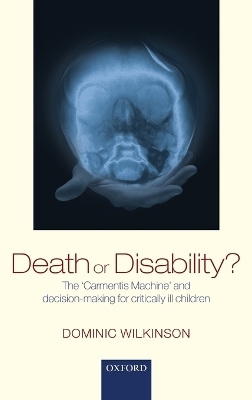
Death or Disability?
The 'Carmentis Machine' and decision-making for critically ill children
Seiten
2013
Oxford University Press (Verlag)
978-0-19-966943-1 (ISBN)
Oxford University Press (Verlag)
978-0-19-966943-1 (ISBN)
Dominic Wilkinson combines philosophy, medicine, and science to explore the profound and contentious ethical issues facing those who work with critically ill children and infants. He addresses questions about the accuracy of predictions for future quality of life; about when to allow children to die; and about how much say parents should have.
In ancient Rome parents would consult the priestess Carmentis shortly after birth to obtain prophecies of the future of their newborn infant. Today, parents and doctors of critically ill children consult a different oracle. Neuroimaging provides a vision of the child's future, particularly of the nature and severity of any disability. Based on the results of brain scans and other tests doctors and parents face heart-breaking decisions about whether or not to continue intensive treatment or to allow the child to die.
Paediatrician and ethicist Dominic Wilkinson looks at the profound and contentious ethical issues facing those who work in intensive care caring for critically ill children and infants. When should infants or children be allowed to die? How accurate are predictions of future quality of life? How much say should parents have in these decisions? How should they deal with uncertainty about the future? He combines philosophy, medicine and science to shed light on current and future dilemmas.
In ancient Rome parents would consult the priestess Carmentis shortly after birth to obtain prophecies of the future of their newborn infant. Today, parents and doctors of critically ill children consult a different oracle. Neuroimaging provides a vision of the child's future, particularly of the nature and severity of any disability. Based on the results of brain scans and other tests doctors and parents face heart-breaking decisions about whether or not to continue intensive treatment or to allow the child to die.
Paediatrician and ethicist Dominic Wilkinson looks at the profound and contentious ethical issues facing those who work in intensive care caring for critically ill children and infants. When should infants or children be allowed to die? How accurate are predictions of future quality of life? How much say should parents have in these decisions? How should they deal with uncertainty about the future? He combines philosophy, medicine and science to shed light on current and future dilemmas.
Dominic Wilkinson is Associate Professor of Neonatal Medicine and Bioethics at the University of Adelaide, and a senior research associate of the Oxford Uehiro Centre for Practical Ethics. He has worked as a doctor in neonatal, paediatric and adult intensive care, and is currently consultant neonatologist at the Women's and Children's Hospital in Adelaide. He has a DPhil in medical ethics from the University of Oxford, and has written a large number of academic articles relating to ethical issues in intensive care.
SECTION A; SECTION B
| Erscheint lt. Verlag | 24.1.2013 |
|---|---|
| Verlagsort | Oxford |
| Sprache | englisch |
| Maße | 162 x 240 mm |
| Gewicht | 626 g |
| Themenwelt | Geisteswissenschaften ► Philosophie ► Ethik |
| Medizin / Pharmazie ► Medizinische Fachgebiete ► Medizinethik | |
| Medizin / Pharmazie ► Medizinische Fachgebiete ► Pädiatrie | |
| Studium ► Querschnittsbereiche ► Geschichte / Ethik der Medizin | |
| ISBN-10 | 0-19-966943-0 / 0199669430 |
| ISBN-13 | 978-0-19-966943-1 / 9780199669431 |
| Zustand | Neuware |
| Haben Sie eine Frage zum Produkt? |
Mehr entdecken
aus dem Bereich
aus dem Bereich
Die Geschichte eines Weltzentrums der Medizin von 1710 bis zur …
Buch | Softcover (2021)
Lehmanns Media (Verlag)
17,95 €
von der Antike bis zur Gegenwart
Buch | Softcover (2024)
C.H.Beck (Verlag)
12,00 €
Krankheitslehren, Irrwege, Behandlungsformen
Buch | Softcover (2024)
C.H.Beck (Verlag)
39,95 €


